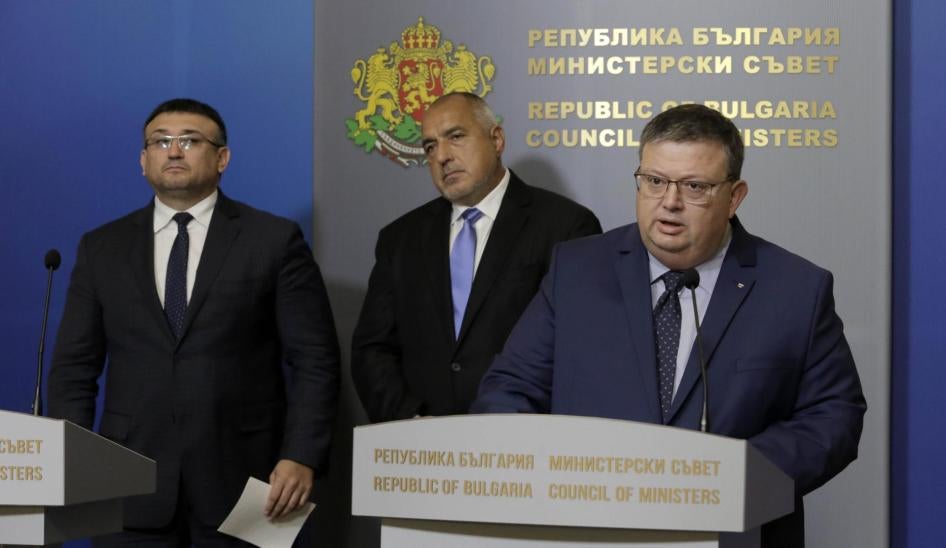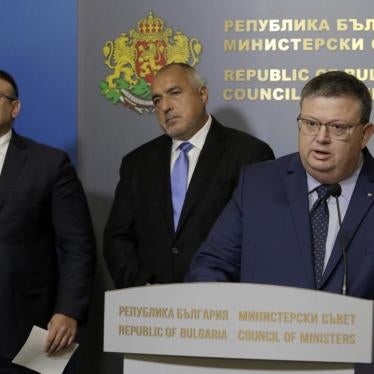(Budapest) – Bulgarian authorities should clarify the legal basis for the continued detention of an Australian citizen, Jock Palfreeman, or release him immediately, Human Rights Watch said today.
Palfreeman appears to have been unlawfully detained in the Busmantsi immigration detention center in Sofia since September 19, 2019, when the Sofia Appellate Court ordered his conditional release — parole — and his deportation to Australia. Although the Appellate Court’s ruling is final under Bulgarian law, the prosecutor general challenged the ruling in the Supreme Court of Cassation, contending that two of the three judges on the panel were biased because they attended seminars organized by a prominent human rights group, the Bulgarian Helsinki Committee, which had given Palfreeman legal aid during his jail term. The Supreme Court of Cassation held a hearing on the matter on October 7 and said it would hand down a decision within two months – as per Bulgarian law.
“Palfreeman was ordered released by a high court in a final decision not subject to appeal. He has his passport and plane ticket. Australia wants him back. Why is he still detained?” said Lydia Gall, senior Eastern Europe and Balkans researcher at Human Rights Watch. “Under the rule of law, you can’t just lock people up or prevent them from leaving just to make a point – there has to be a clear legal basis or it’s unlawful.”
Palfreeman’s lawyer, Kalin Angelov, told Human Rights Watch that the Sofia Prosecutor’s Office issued a travel ban for his client in the days following the parole decision. Angelov said that neither he nor his client had seen the travel ban yet, despite a formal request, and that he could not fathom the grounds for the ban. Angelov said that almost three weeks after his client was taken to Busmantsi immigration detention center, neither of them have received an official document outlining the legal basis for his client’s continued detention. In a letter dated October 4, Human Rights Watch asked the interior minister and the prosecutor general to clarify the legal basis for the travel ban, and if no legal basis exists, to urge his immediate release. Human Rights Watch has not received a reply.
The right to leave a country is a basic right and any restriction should be based in law and be individual and proportionate, Human Rights Watch said. Any restrictions on travel should be temporary and with the right to appeal.
Palfreeman’s September 19 conditional early release from prison sparked an outcry among politicians and the media. Palfreeman had been convicted in 2009 and sentenced to 20 years in prison for the 2007 murder of a Bulgarian student. Palfreeman maintains his innocence. The Bulgarian Helsinki Committee provided legal aid and other support to Palfreeman.
Following the parole decision, the political party VMRO (Bulgarian National Movement), one of the members of Prime Minister Boyko Borissov’s ruling coalition, asked the prosecutor general to de-register the Bulgarian Helsinki Committee, saying that it “directly and indirectly exerts pressure on Bulgarian magistrates and engages in unconstitutional, unlawful, immoral and openly anti-Bulgarian activities.”
The prosecutor general on October 8 issued a statement saying that he will not bring proceedings to de-register the Bulgarian Helsinki Committee. In response, the VMRO issued their own statement saying that the party will start its own legal proceedings requesting the group’s de-registration – a legal possibility under Bulgarian law.
The media has reported that Parliament will consider amendments to the code of criminal procedure, prompted by the Palfreeman case, to allow for review of final parole decisions in extraordinary circumstances.
The case has also split Bulgaria’s legal system. The 25-member Supreme Judicial Council, the supreme administrative body of the Bulgarian judiciary, issued a highly unusual statement following the parole decision, expressing its sympathy for the relatives of the man who had been killed and shared “their sense of broken balance between law and justice.” The unusual and seemingly interfering statement prompted a critical reaction by the head of the Supreme Court of Cassation and resulted in a rebuke signed by 292 judges defending the impartiality and independence of the judiciary.








